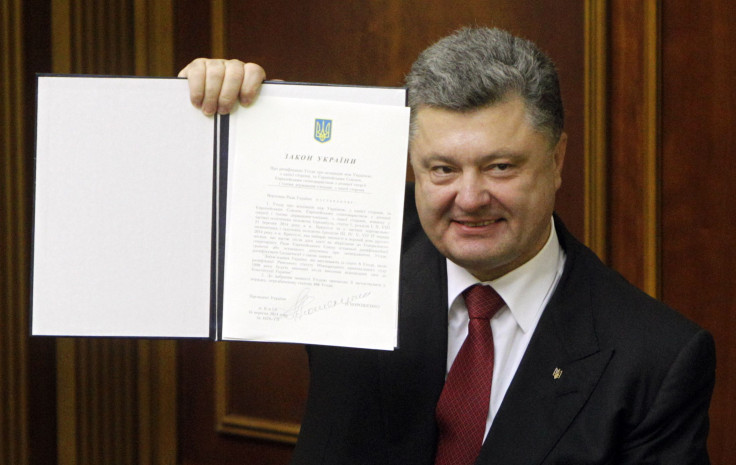Ukraine Passes Law Granting Rebels Limited Self Rule, Ratifies EU Association Agreement

Ukraine’s parliament passed a law Tuesday offering special status to regions in the control of pro-Russia rebels, in an effort to establish peace in the region, the Wall Street Journal reported. The law had been criticized by some of the country’s leaders who said that President Petro Poroshenko was handing over sovereign territory to the rebels.
"At the initiative of the president and by the hands of parliament, Donbas has been surrendered,” Andriy Shevchenko, a pro-European lawmaker, said on his Twitter page, according to the Journal.
The law, which offers three years of self rule after elections on Dec. 7, was part of a cease-fire agreement signed between Ukraine and the separatists on Sept. 5, and also offers amnesty to the latter. However, the rebels demand full independence from Ukraine, the Journal reported.
Meanwhile, lawmakers in Ukraine and Europe also signed an agreement that takes the former a step closer to joining the European Union, and promises deeper economic and political ties with the EU, Associated Press reported. Ukraine's decision to join the EU was at the center of the protests that rocked Kiev earlier this year, which eventually led to the ouster of former President Viktor Yanukovych, Russia's annexure of the Crimean peninsula and the ongoing unrest in eastern Ukraine.
Ukraine is preparing to offer a limited three-year control of rebel-held areas of eastern Ukraine to pro-Russia separatists, amid continuing clashes. On Monday, authorities in Donetsk said six people were killed and 15 injured in fresh clashes between government-led forces and rebels.
Ukraine’s President Petro Poroshenko presented a peace package in the parliament Tuesday to allow pro-Moscow rebels to establish a limited self-rule in parts of the country's east, according to Agence France-Presse, or AFP. The move follows ongoing clashes, which have continued despite a cease-fire agreement signed between the warring factions on Sept. 5.
Poroshenko reportedly said, according to AFP, that this method would guarantee "the sovereignty, territorial integrity and independence of our state."
Ukrainian and European leaders will also sign an agreement at 10 a.m. GMT (6 a.m. EDT), which deepens ties between the country and the European Union.
Clashes continued near Donetsk’s international airport, held by the government, after two of the city’s northern neighborhoods were heavily shelled over the weekend. On Monday, Kiev and rebel forces exchanged 73 soldiers from each side in the largest prisoner exchange so far in the conflict. However, the violence reportedly continued with blasts reported from the direction of the airport while gunfire continued in the region, Associated Press, or AP, reported citing local officials.
"The government in Kiev is only using the ceasefire to regroup its forces and attack us again," the self-declared Donetsk People's Republic leader Alexander Zakharchenko said, AFP reported.
However, Col. Andriy Lysenko, spokesman for the Ukrainian National Security and Defense Council, told AP: "Neither today, nor yesterday, nor in the previous days did Ukrainian forces shell any residential areas."
NATO Secretary-General Anders Fogh Rasmussen, told AP, in an interview Monday that nearly 1,000 Russian soldiers are still present in Ukraine and several more were present on the border, despite Russia's denial that it had any hand in fomenting violence in the region.
"While the Russians may have withdrawn some of their troops in Ukraine, there is a still Russian military presence within Ukraine," Rasmussen said according to AP.
Last week, the U.S. and the European Union imposed fresh sanctions against Russia, while Moscow’s leaders expressed their displeasure over the move, and said that the West is ignoring Russia’s efforts in attempting to ensure peace in the region, amid a cease-fire. On Monday, nearly 1,300 NATO troops from 15 countries began an 11-day Rapid Trident military drills in Lviv in western Ukraine.
On Tuesday, Speaker Sergei Naryshkin accused the U.S. and its allies of creating conditions that could result in a new cold war.
© Copyright IBTimes 2025. All rights reserved.





















